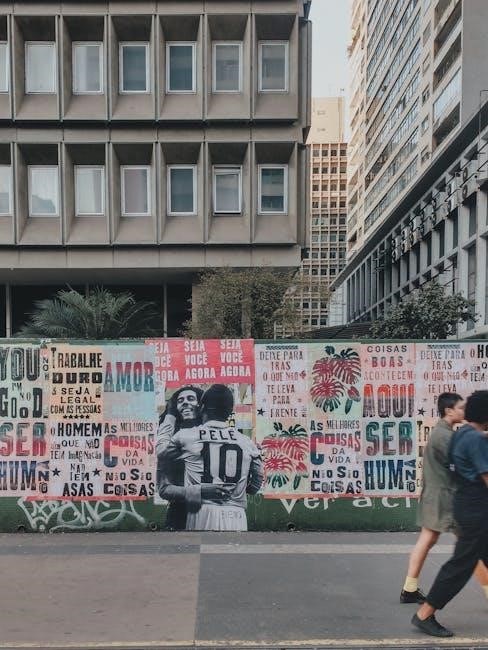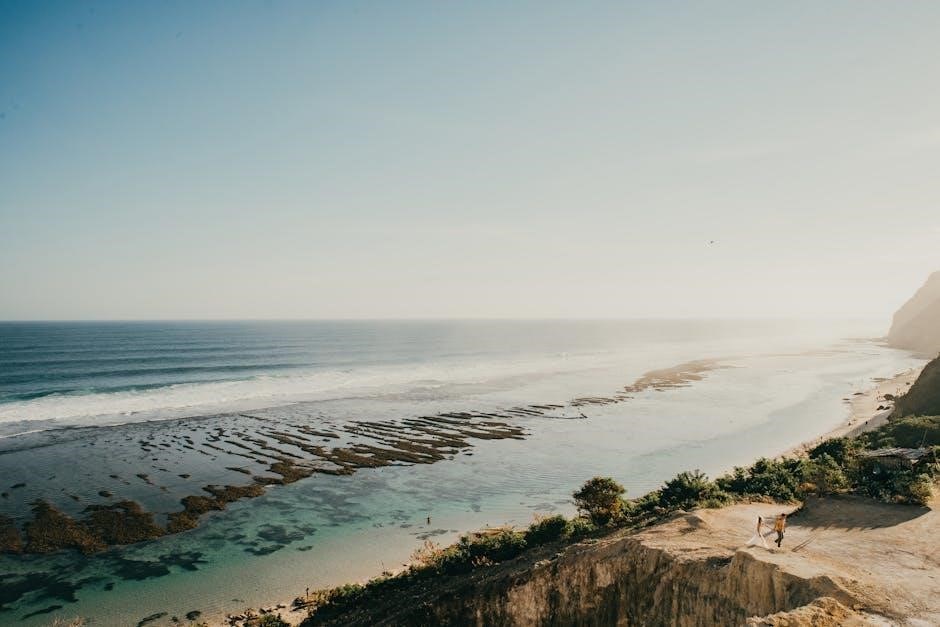Dua Arafah is a powerful supplication recited on the Day of Arafah, a pivotal moment in Hajj․ It seeks forgiveness, mercy, and spiritual growth, benefiting all believers․
Overview of the Day of Arafah
The Day of Arafah, observed on the 9th of Dhul-Hijjah, is a sacred moment in Islam, particularly for pilgrims performing Hajj․ It commemorates Prophet Muhammad’s (PBUH) final sermon, emphasizing unity, equality, and spiritual renewal․ Pilgrims gather at the plains of Arafat, engaging in fasting, supplications, and reflection․ Fasting on this day is a Sunnah, even for non-pilgrims, seeking forgiveness and mercy․ The day highlights the importance of sincerity, humility, and devotion, making it a pivotal occasion for Muslims worldwide to reconnect with their faith and seek divine blessings․
Significance of Dua Arafah in Islam
Dua Arafah holds immense significance as a heartfelt supplication to Allah, seeking forgiveness, mercy, and spiritual elevation․ Recited on the Day of Arafah, it embodies the essence of devotion and humility․ This sacred prayer is a Sunnah, emphasizing its importance in Islamic tradition․ By reciting it, believers strive to strengthen their connection with Allah, reflecting on their deeds and seeking divine pardon․ Its profound impact lies in its ability to inspire self-reflection and foster a deeper sense of spirituality, making it a cherished practice among Muslims worldwide․

The Day of Arafah in the Quran and Hadith
The Quran highlights the Day of Arafah in Surah Al-Araf, emphasizing its spiritual significance․ Hadiths mention the Prophet (PBUH) stressing forgiveness and mercy on this blessed day․
Quranic References to the Day of Arafah
The Quran refers to the Day of Arafah in Surah Al-Araf, which means “The Heights” in English․ This surah, revealed in Mecca, underscores the spiritual significance of the day․ It emphasizes Allah’s mercy and forgiveness, highlighting the importance of seeking divine pardon․ The Quran also mentions the gathering of pilgrims at Arafat, symbolizing unity and devotion․ These references underscore the day’s role in the Islamic calendar and its connection to the Hajj pilgrimage․ The Quranic verses inspire believers to reflect on their faith and seek Allah’s blessings during this sacred time․
Hadiths Highlighting the Importance of Arafah
The Prophet Muhammad (PBUH) emphasized the significance of the Day of Arafah, stating it is a day when Allah forgives numerous sins․ He recommended fasting on this day, calling it an expiation for sins․ Pilgrims at Arafah are encouraged to recite Dua Arafah, a supplication seeking mercy and guidance․ The Prophet also highlighted that no day surpasses Arafah in Allah’s forgiveness, making it a time for spiritual reflection and devotion․ These Hadiths underscore the day’s importance and encourage believers to maximize its blessings through sincere worship and supplication․

Recommended Actions on the Day of Arafah
On the Day of Arafah, pilgrims combine Dhuhr and Asr prayers, while non-pilgrims are encouraged to fast․ Attend congregational prayers, engage in dhikr, and seek Allah’s mercy․
Fasting on the Day of Arafah
Fasting on the Day of Arafah is a Sunnah recommended by the Prophet Muhammad (peace be upon him)․ It is a means of seeking Allah’s forgiveness and mercy, and it is considered a spiritual discipline that strengthens self-control․ Pilgrims and non-pilgrims alike are encouraged to observe this fast, as it is a day when Allah liberates many from Hellfire․ Fasting on this day is not obligatory but highly rewarded, and it is a beautiful opportunity to draw closer to Allah through worship and devotion․ It is a powerful act of worship that reflects one’s commitment to faith and spiritual growth․
Performing Dhuhr and Asr Prayers at Arafat
Pilgrims combine the Dhuhr and Asr prayers during their time at Arafat, a practice rooted in Islamic tradition․ This act is considered a crucial part of the Hajj rituals, emphasizing unity and devotion․ The prayers are performed in congregation, fostering a sense of community and shared spiritual purpose․ By fulfilling this obligation, pilgrims demonstrate their commitment to following the Sunnah of the Prophet Muhammad (peace be upon him)․ The combination of these prayers at Arafat is a unique and significant aspect of the Hajj experience, reflecting the importance of this sacred day in Islam․
Making Dua at the Plains of Arafah
Making dua at Arafah is a heartfelt expression of devotion, seeking Allah’s forgiveness and mercy․ Pilgrims stand humbly, raising their hands in supplication, often reciting specific duas from the Quran and Sunnah․ The plains of Arafat are considered a place of divine mercy, where duas are readily accepted․ Believers are encouraged to pour their hearts out, expressing gratitude, repentance, and hope․ This sacred moment is a climax of the Hajj journey, offering a profound opportunity for spiritual renewal and connection with the Almighty․ The act of making dua at Arafah is a timeless tradition that embodies the essence of Islamic worship and submission to Allah’s will․

The Dua of Arafah
Dua Arafah is a profound supplication recited on the Day of Arafah, seeking divine forgiveness and mercy․ It is a cherished Islamic prayer, reflecting deep spirituality and devotion․
Text and Translation of Dua Arafah
The Dua of Arafah is a sacred supplication recited on the Day of Arafah during Hajj․ Its text begins with, “Labbayk, Allāhumma Labbayk” (Here I am, O Allah, here I am)․ The dua continues with heartfelt requests for forgiveness, mercy, and guidance․ A key portion includes, “O Allah, forgive me and have mercy upon me, and grant me Your pleasure and Taqwa (fear of Allah)․” The translation reflects its deep spiritual significance, emphasizing submission to Allah and seeking His divine blessings․ Reciting this dua with sincerity is highly recommended, especially on the plains of Arafah․
Meaning and Spiritual Significance of the Dua
The Dua of Arafah embodies profound spiritual depth, focusing on submission, humility, and devotion to Allah․ It emphasizes seeking forgiveness, mercy, and guidance, while expressing gratitude for divine blessings․ The supplication reflects the believer’s desire to strengthen their relationship with Allah, cultivate Taqwa, and attain spiritual purification․ Its recitation during Hajj, particularly on the plains of Arafah, is considered a means of drawing closer to Allah and seeking His grace․ The dua’s significance lies in its ability to inspire self-reflection, renewal of faith, and a commitment to righteous living․
When and How to Recite Dua Arafah
Dua Arafah is ideally recited on the Day of Arafah, specifically during the Wuquf (standing) at the plains of Arafat․ For pilgrims, it is recited after the combined Dhuhr and Asr prayers․ Non-pilgrims can also recite it at home, facing the Kaaba if possible․ The dua should be recited with sincerity and focus, preferably aloud, to express humility and devotion․ It is recommended to recite it multiple times, especially during the afternoon, as this is considered the most blessed time․ The supplication is a powerful means of seeking divine mercy, forgiveness, and spiritual elevation․

How to Prepare for Dua Arafah
Prepare by seeking forgiveness, fasting, and purifying your heart․ Engage in spiritual reflection and perform obligatory prayers to create a receptive state for divine acceptance․
Spiritual Preparation for the Day of Arafah
Spiritual preparation for the Day of Arafah involves seeking forgiveness, engaging in sincere du’a, and reflecting on one’s relationship with Allah․ Fasting is recommended to purify the soul and strengthen self-control․ Pilgrims and non-pilgrims alike should focus on heartfelt supplications, demonstrating humility and gratitude․ This day is a unique opportunity to reconnect with Allah, seeking mercy and guidance․ By cultivating fear and love for Allah, believers can approach the day with a receptive heart, ensuring their du’as are more likely to be accepted․ Spiritual readiness is key to maximizing the blessings of this sacred occasion․
Physical and Mental Readiness for Dua
Physical and mental readiness is essential for engaging in Dua Arafah effectively․ Ensure proper hygiene, wear clean and modest attire, and maintain a calm demeanor․ Fasting on the Day of Arafah is recommended to enhance spiritual focus․ Mentally, cultivate sincerity, humility, and a deep connection with Allah․ Avoid distractions and allocate specific times for reciting the Dua․ Proper time management ensures that prayers and supplications are performed with concentration․ Physical readiness includes being well-rested and hydrated to endure the day’s spiritual activities․ A composed mind and body foster a greater sense of devotion and receptivity to Allah’s mercy․ This preparation amplifies the impact of Dua Arafah․

Benefits of Reciting Dua Arafah
Reciting Dua Arafah brings forgiveness, mercy, and increased Taqwa․ It strengthens one’s spiritual connection with Allah, fostering self-reflection and humility, while seeking divine acceptance and blessings․
Forgiveness and Mercy from Allah
Reciting Dua Arafah is a means to attain Allah’s forgiveness and mercy․ The Day of Arafah is renowned for its abundance of divine pardon, as Allah frees countless souls from Hellfire․ Through sincere supplication, believers seek forgiveness for past sins, cleansing their hearts and renewing their spiritual connection with Allah․ This sacred moment offers an opportunity to humble oneself, acknowledging human frailty and seeking divine compassion․ The mercy of Allah is limitless, and Dua Arafah serves as a powerful tool to invoke His blessings, fostering a deeper sense of gratitude and devotion in those who recite it with faith and sincerity․
Increased Taqwa (Fear of Allah)
Reciting Dua Arafah strengthens one’s Taqwa, fostering a profound fear of Allah․ This supplication encourages believers to reflect on their actions, seeking to align them with divine will․ By imploring Allah to grant the ability to fear Him as if one sees Him, the heart becomes more conscious of His presence․ This heightened sense of accountability leads to increased piety and a stronger commitment to righteous living․ Dua Arafah nurtures a mindset of humility and devotion, inspiring believers to prioritize spiritual growth and uphold Allah’s commands in their daily lives, thereby deepening their connection with Him․
Acceptance of Supplications
Dua Arafah is renowned for its potential in securing the acceptance of supplications․ The Day of Arafah is a time when Allah’s mercy and forgiveness are abundantly bestowed, making it an ideal moment for prayers to be accepted; Believers are encouraged to make heartfelt duas, as the likelihood of their acceptance is heightened․ This day emphasizes the importance of sincerity and faith, as Allah is most inclined to respond to the calls of His servants․ It is a blessed opportunity to seek divine favor, not just for those performing Hajj, but for all Muslims striving to connect with Allah through genuine supplication․
Dua Arafah for Those Not Performing Hajj
Muslims not performing Hajj can still benefit by fasting, reciting Dua Arafah, and engaging in sincere supplication․ Their duas are equally valued and rewarded by Allah․
Participating in the Blessings of Arafah at Home
Even those not performing Hajj can participate in the blessings of Arafah by fasting, reciting Dua Arafah, and engaging in sincere supplication․ At home, Muslims can reflect on the significance of the day, combine Dhuhr and Asr prayers, and dedicatedly recite the Dua․ It is encouraged to spend the day in acts of worship, such as dhikr, Quran recitation, and seeking forgiveness․ By doing so, one can connect spiritually to the pilgrims at Arafat and benefit from the day’s divine mercy․ Sincerity and focus in these acts ensure a meaningful experience, making the day a source of spiritual growth and renewal․
Recommended Duas for Non-Pilgrims
For non-pilgrims, recommended duas on the Day of Arafah include seeking forgiveness, mercy, and spiritual growth․ Reciting the Dua of Arafah, even at home, is highly encouraged․ One should also supplicate for family, friends, and the Muslim ummah․ Sincerity is key, as Allah accepts heartfelt prayers․ Additionally, reciting Quranic verses, especially those related to mercy and forgiveness, is beneficial․ Non-pilgrims can also follow the Prophet’s Sunnah by fasting and combining Dhuhr and Asr prayers․ Engaging in dhikr and istighfar (seeking forgiveness) throughout the day further enhances the spiritual experience, allowing one to connect with the blessings of Arafah regardless of location․

Common Mistakes to Avoid on the Day of Arafah
Overlooking the significance of fasting and neglecting sincere dua recitation are common mistakes․ Ensure heartfelt supplications and prioritize spiritual focus to maximize the day’s blessings and forgiveness․
Overlooking the Importance of Fasting
Fasting on the Day of Arafah is a highly recommended Sunnah, offering immense spiritual rewards․ Many believers neglect this practice, unaware of its significance․ It is a means of seeking Allah’s forgiveness and mercy․ Fasting demonstrates self-control and devotion, aligning with the Prophet’s teachings; Ignoring this duty can deprive one of the day’s unique blessings․ Muslims are encouraged to prioritize fasting, ensuring they do not miss this opportunity for spiritual growth and divine pardon․ It is essential to recognize fasting as a vital act of worship on this sacred day․
Not Reciting Dua with Sincerity
Reciting Dua Arafah without sincerity is a common mistake, diminishing its spiritual impact․ Many believers utter the words mechanically, lacking heartfelt focus․ Sincerity is crucial, as Allah accepts only those supplications made with genuine intention and concentration․ Distractions, such as worldly concerns, can hinder the purity of the dua․ Muslims must prioritize a sincere connection with Allah, reflecting on their words and intentions․ Without sincerity, the dua may not achieve its full potential, making it a missed opportunity for divine mercy and forgiveness․ It is essential to approach Dua Arafah with a humble and attentive heart․
The Day of Arafah holds profound significance, offering forgiveness and mercy․ Believers are encouraged to utilize this blessed day to strengthen their faith and seek divine favor․
Final Thoughts on the Significance of Dua Arafah
Dua Arafah encapsulates the essence of spiritual reflection and divine connection․ It serves as a reminder of Allah’s mercy and forgiveness, emphasizing the importance of sincerity and faith․ Through this supplication, believers seek not only forgiveness but also a deeper understanding of their purpose․ The Day of Arafah is a testament to Islam’s emphasis on personal growth and humility, making Dua Arafah a timeless and universal prayer for all Muslims․ Its significance extends beyond Hajj, offering guidance and solace to those seeking a closer relationship with Allah․
Encouragement to Utilize the Day of Arafah
The Day of Arafah presents a unique opportunity for spiritual renewal․ Muslims are encouraged to seize this blessed day by engaging in fasting, reciting Dua Arafah, and reflecting on their faith․ Whether performing Hajj or observing from home, the day offers a chance to strengthen one’s connection with Allah․ By sincerely seeking forgiveness and mercy, believers can harness the day’s immense blessings․ Embrace this sacred moment to rejuvenate your spirit, seek divine pardon, and align your heart with Allah’s will, ensuring a profound and lasting impact on your spiritual journey․
Additional Resources
Find Dua Arafah PDF guides on websites like yaqeeninstitute․org and other reputable Islamic platforms․ These resources provide detailed prayers, translations, and insights for meaningful supplication․
Where to Find Dua Arafah PDF Guides
Reliable Dua Arafah PDF guides can be found on trusted Islamic websites and platforms․ Websites like Ya’qeen Institute and other reputable sources offer downloadable PDFs․
These guides often include the Arabic text, English translations, and explanations of the supplication․ They are designed to help believers understand and recite Dua Arafah with proper intention․
Additionally, many Islamic apps and e-book platforms provide access to Dua Arafah PDFs, making it easy to access and share this important supplication․
Recommended Reading and References
For a deeper understanding, explore reputable Islamic sources like “Bihar al-Anwar” and “The Best Duas for the Day of Arafah” by Ya’qeen Institute․
These resources provide insights into the significance and proper recitation of Dua Arafah․ Additionally, books on Hajj and supplications, such as “The Book of Hajj and Umrah” by Sheikh Nasir al-Albani, offer valuable context․
Reliable websites and apps like MuslimPro and Quran Academy also feature detailed guides and PDFs on Dua Arafah, ensuring accessibility for all believers․
Always verify the authenticity of sources to ensure accuracy and adherence to Islamic teachings․

